 Image Courtesy: bit.ly/19fYumP
Image Courtesy: bit.ly/19fYumP Impact Of Online Learning
The success of Battushig Myanganbayar is proof of how effective online education actually is. Technology has enabled this talented student to access education in his desired field. At present, he is working with the popular online learning platform edX, which originally developed the course he studied from Mongolia. Myanganbayar has partnered with the platform to better student experience in future.
However, we need to consider a bigger question: can we use online courses to help students in the developing nations, not just talented students? In 2015, Bill Gates expressed in his foundation’s annual letter that in future top-notch education can be accessed by anyone around the globe with just a few taps. He commented “Before a child even starts primary school, she will be able to use her mom’s smartphone to learn her numbers and letters, giving her a big head start. Software will be able to see when she’s having trouble with the material and adjust for her pace. She will collaborate with teachers and other students in a much richer way.”
Gates thinks that career paths will be incorporated in the new education system; learners will be empowered to rise above poverty by identifying the necessities of their preferred field and satisfying them through online courses. He also believes that software will help students to connect with distant educators and fellow learners.
Rise Of MOOCs
Although the idea of distant learning dates back to the days of correspondence courses, now it mainly refers to MOOCs or massively open online courses. MOOCs are often organised by colleges, universities, non-profits and businesses. These online courses offer education through live streaming videos, online lectures, projects and assignments and enable numerous learners to study in a flexible way. However, some experts are still unsure about the impact of MOOCs and how to assess it. Michael Trucano, World Bank technology and education specialist, said “We’re the World Bank, so we like to have data on all the stuff we say, right? There frankly isn’t a lot of good data on this, at all.”
The most popular and largest MOOC platform, Coursera asserts that around 11 million students can sign up for numerous courses from educators at Stanford, Princeton, Yale and other reputed universities. Daphne Koller, co-founder and president of Coursera, claims that around one third of all its students are from developing nations.
Focussing On Practical Implementation
Although learners like Myanganbayar use online courses to jump to top-notch traditional education, Koller believes in practical success stories like Bangladeshi student Sharmeen Shehabuddin, who learned how to run a bakery business via an online business programme. She said “We see a lot of lifting up happening along our learners. We hear anecdotal stories about people whose lives are entirely transformed.”
CEO of edX, Anant Agarwal, has a similar view. He said “Education is a path to prosperity, better economics, jobs, and frankly, world peace. An educated world is simply a better world.”
 RSS Feed
RSS Feed
